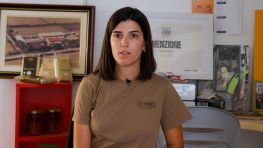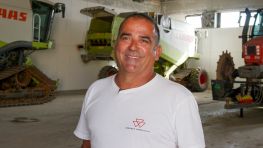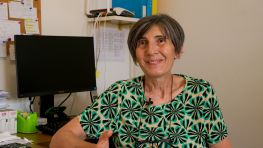 Rosalia Vacca and the Dream of…
Rosalia Vacca and the Dream of… Fulvio Stocchi
The birth of the "green mulch" for organic rice in Rovasenda.
Fulvio stocchi, born in 1950, was born in Rovasenda, at the Cascina dell'Angelo. Since he was a child he began to follow the work on the farm with ease using tractors, chainsaws and other tools considered suitable for adults. He remembers well when, with his father, they began to "level" the lands of Baraggia to obtain rooms where to grow rice, as well as the transition from the traditional farmhouse, in which agriculture and breeding coexisted in a symbiotic relationship, to the modern farmhouse, specialized in only rice production, without the help of animal force, replaced by tractors and synthetic chemistry.
The Stocchi family has always entrusted its destinies to the lands of Baraggia known for being strongly clayey and among the poorest in Europe. The experience of the disease forever changed the relationship with the farmer's work for Fulvio and the desire to do without herbicides and pesticides to grow rice began to take shape.
The Stocchi, supported by the experience of Giovanni Pansarasa, thus began the first experiments in organic rice farming, going through phases of extreme difficulty, alternating with partial successes. Over the years they have managed to codify a method that integrates traditional cultivation techniques, mostly abandoned by conventional agriculture, such as green manure and crop rotation, with techniques particularly suitable for the Baraggia lands such as green mulch.
Fulvio still remembers with extreme clarity the day he decided to sow rice in the middle of a flourishing meadow of grass. An apparently absurd action that was, however, the turning point for his farm and beyond. After sowing he mashed the grass on the lawn with a roller and flooded the field. After eight days the rice began to sprout and after a few weeks the field was practically perfect: rice plants as far as the eye could see with no weeds in between! In the following years, the results of the Stocchi family became the reference point for many other producers in the Rovasenda area and for the research of numerous universities, favoring the birth of the main organic rice production center in Europe and the Piedmontese organic rice district.
Video table of contents
- Presentation.
- A little devil in the farmhouse.
- The leveling and poor lands of Baraggia.
- From mondine to chemistry, the first doubts.
- The disease and the first evidence of natural rice.
- In search of a method to make organic rice and the clash with the fake organic.
- The first tests, the green manure, let the earth rest.
- The first years, the difficulties, the fears, the success with sowing in the middle of the grass.
- Share the results to get a true Bio and checkmate to those who supply the chemistry.
- The second generation and the circular company: the rice mill, the point of sale.
- Rice has a ph 7.6 / 7.7: the same ph of our body.
- The neighbors thought we had gone mad.
- Changing is difficult, it requires the ability to observe nature.
- Skeptical neighbors, the importance of health.
- The point of sale, customer relations, community with other farmers.
- Restoring the environment, the economy is the point of arrival: the hedges, the trees return to the paddy field.
- The native water turtles.
- Observe: the importance of Giovanni Pansarasa's experience.
- Green mulch does not do well in sandy soils.
- With the rhythms of nature, we produce less but we and the environment stay healthy.
- Brown rice, we never ate it.
- White rice lasts longer because it is deprived of the germ: this is the reason why the industry has favored its consumption.
- The poor did not know they were eating healthy.
- The return of butterflies with respected nature.
- The fight against insects with chemistry: it is like eliminating the symptom but not the disease.
- Rice and milk.
- The concrete canal.
Interview information
Country: IT
Region: Piemonte
City: Rovasenda
Fulvio Stocchi
Date of birth: 03-31-1950
Profession: Farmer
Languages: Italiano
Document by: Luca Ghiardo
Video by: Luca Ghiardo
Created: 07-05-2021
Questo video fa parte del seguente archivio
Rice stories
Rice stories
Food is a fundamental resource for man and his health, both through the supply of nutrients and the ability to embody traits of human culture that play a leading role in our well-being.
Over time, each territory has built original ways in which to relate to the fruits of its land, enriching them with rituals, symbolic meanings and culinary customs. Much of these relationships have been lost following the years of the economic boom, with the exodus from the countryside to urban centers, with the advent of agriculture for mass production and ultimately with the globalization of markets and the consequent impoverishment of the heritage of biodiversity and ethnodiversity.
The purpose of this archive is to collect evidence relating to the main rice production area in Europe, that is the Po Valley, and to investigate, through the analysis of textual sources and testimonies collected in the field, both what survives of this heritage, and the ways in which which has evolved and reached us, paying particular attention to the explicit and implicit links that bind food and health.






